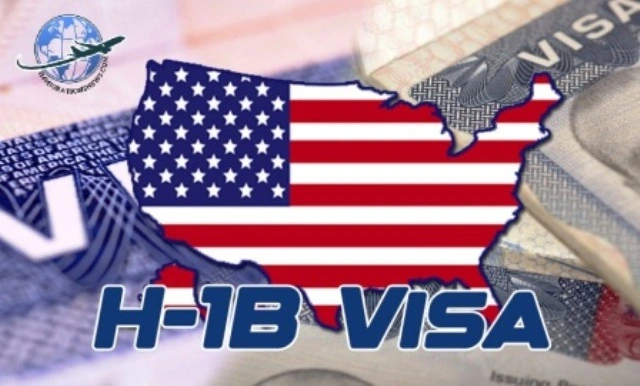In a significant shift to the H-1B visa process, the United States has introduced new rules under the current administration. Previously, a technical degree was sufficient for eligibility. However, as of the recent changes, specialization is now a mandatory requirement. This move has stirred considerable debate, especially among technical workers and applicants hoping to work in the U.S. for companies seeking skilled professionals.
In this post, we’ll dive deep into what the H-1B visa changes mean for applicants, why specialization has become mandatory, and how this could affect those looking to work in the United States under the H-1B program.
What is the H-1B Visa?
The H-1B visa is a non-immigrant visa that allows U.S. companies to employ foreign workers in specialized fields, typically in technical professions such as engineering, IT, and medicine. It’s one of the most common work visas issued by the U.S. Citizenship and Immigration Services (USCIS), with 65,000 visas available every year.
Key Features of the H-1B Visa:
- Allows foreign nationals to work in the U.S. in specialized roles.
- Duration: Typically three years, extendable up to six years.
- Family Eligibility: Applicants can bring their spouse and children to the U.S.
- Path to Citizenship: H-1B visa holders can apply for U.S. citizenship after their visa expires.
New H-1B Visa Rule: Specialization is Now Mandatory
The new changes to the H-1B visa requirements introduced by President Trump have shaken up the traditional process. Under the previous system, a technical degree was enough to qualify for an H-1B visa. For example, if you had a computer science degree, you would have been eligible to work in any job related to computer science or engineering. However, the new rule requires that applicants show their specialization in the specific field they plan to work in.
This means that even if you hold a degree in computer science, you must now demonstrate a clear and direct connection between your degree and the job you’re applying for. Simply having a degree in a technical subject won’t be enough to ensure eligibility for an H-1B visa.
Why Specialization Is Now Mandatory for H-1B Visas
The introduction of this new rule aims to make the H-1B visa program more aligned with the actual needs of U.S. employers. Many believe the previous system was too broad, allowing candidates with general degrees to qualify for roles that didn’t directly align with their educational background. By requiring specialization, the U.S. hopes to better target foreign workers who possess the exact skills needed by U.S. companies.
| Old H-1B Visa Requirement | New H-1B Visa Requirement |
|---|---|
| Technical degree in a related field | Specialization required for the role you’re applying for |
| No direct connection between degree and role | Must show direct link between degree and job specialization |
This change will likely result in more competitive applicants and may benefit U.S. employers by ensuring that foreign talent is more accurately matched to the needs of the industry.
How Will This Affect Indian Companies and Tech Workers?
India has long been a major contributor to the H-1B visa program, with many Indian-origin tech companies being the primary employers of H-1B visa holders. According to the US Citizenship and Immigration Department, during the period from April to September 2024, 24,766 H-1B visas were granted to companies of Indian origin.
With the new rule in place, Indian tech workers—who often make up a significant portion of the H-1B applicants—will now need to provide proof of their specialized skill set. This could mean additional challenges for Indian companies that rely on H-1B workers for roles in the IT sector, as applicants will need to meet stricter requirements for proving their qualifications.
Indian Companies Leading in H-1B Visas
| Company | Number of H-1B Visas (April – September 2024) |
|---|---|
| Infosys | 5,000+ |
| Tata Consultancy Services | 4,000+ |
| Wipro | 3,000+ |
| Cognizant | 2,500+ |
These companies, along with others, will need to adjust their recruitment and visa application strategies to ensure they meet the updated specialization requirements.
How Does This Impact Applicants?
The specialization requirement adds an extra layer of complexity to the H-1B visa application process. Candidates will now need to:
- Provide more detailed documentation proving their expertise in the specific area of their job.
- Demonstrate that their qualifications and experience align with the role they’re applying for.
- Be prepared for increased scrutiny and potential denials if they fail to prove the necessary specialization.
This change also means that the H-1B visa application process could become more competitive and time-consuming, making it crucial for applicants to carefully prepare their applications.
Navigating the New H-1B Visa Rules
The new H-1B visa rules, requiring specialization instead of just a technical degree, represent a significant shift in how the U.S. is selecting workers for specialized roles. While the updated rules aim to improve the match between workers’ skills and the needs of U.S. employers, it also poses additional challenges for international applicants, particularly from India.
For those looking to apply for an H-1B visa, it’s important to understand the changes and ensure that your qualifications are aligned with the specific demands of the job you are seeking. As the H-1B visa continues to be a vital pathway for foreign professionals to work in the U.S., understanding these new requirements will be key to success.
For applicants, it’s now more important than ever to demonstrate their specialized skill sets and educational backgrounds that are directly relevant to their job roles. By doing so, they can increase their chances of securing one of the 65,000 H-1B visas issued every year.
For more updates on US visa regulations and how they may impact your plans, stay tuned!



